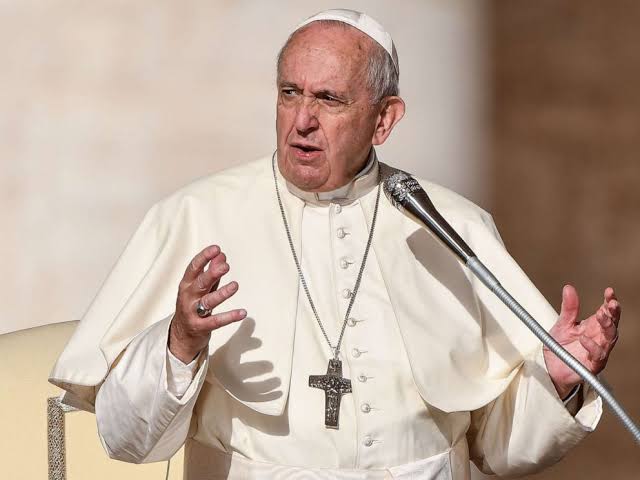 Pope Francis is coming to Thailand and Japan to deliver messages to the two countries where Catholicism does not grow enough. (Image via ABC News - Go.com)
Pope Francis is coming to Thailand and Japan to deliver messages to the two countries where Catholicism does not grow enough. (Image via ABC News - Go.com)
Pope Francis goes to Hiroshima and Nagasaki for denuclearization campaign
As a part of his seven-day denuclearization tour from Thailand to Japan, Pope Francis is visiting the site most iconic in the WWII era where two atomic bombs were dropped, in Hiroshima and Nagasaki.On the upcoming Tuesday, Pope Francis, becoming the Pope since 2013, is leaving for Thailand for his 32nd world tour. And, he is expected to arrive in Japan after an 11-and-a-half-hour long flight. The Pope’s visit to both countries is signaling encouragement for the tiny Catholic communities in Thailand and Japan.
For your record, Catholic populations in Japan and Thailand are only around 536,000 and 389,000 respectively, making less than one percent in each country. Even if those populations are combined, it is less than the number of people the Pope attracted when visiting a country.
Arriving in Thailand, Pope Francis is set to meet with the leader of Buddhists in Thailand, Somdet Phra Maha Muniwong, and King Maha Vajiralongkorn. For his interpreter, Pope Francis will be accompanied by his cousin, Sister Ana Rosa Sivori, who has been serving in Thailand for more than 50 years.
During his four-day stay in Thailand, Pope Francis will deliver a message for the eradication of human trafficking and sex tourism. In 2019, the human trafficking rate in Thailand jumped to its highest point.
In Japan, Pope Francis will deliver a message calling for the total ban of a nuclear weapon. About 400,000 people died due to nuclear radiation when the United States (U.S) dropped the nuke on Hiroshima and Nagasaki on 6 August 1945.
For Pope Francis, the nuclear weapon should not be kept even for deterrence.
The Pope is scheduled to meet with the survivors of the Hiroshima and Nagasaki incidents, pray for them, and deliver the loud and clear message about the nuclear ban. Later on, Pope Francis will be visiting Peace Memorial Park in Hiroshima.
In 2011, the Fukushima nuclear power plant melted down due to the tsunami and earthquake, infecting hundreds of thousands of people. After the incident, Japan's Catholic Bishops Conference formally asked the Prime Minister of Japan, Shinzo Abe, to abolish any nuclear power plant and oppose Abe’s move to revise Japan’s post-war pacifism stance.
Pope Francis is also scheduled to meet with the descendants of the “underground Japanese Christians” who adhere to their faith even in times of past persecution.
In 1549, Christianity was introduced to Japan, to be banned later in 1614. The Japanese Christians were persecuted by making them choose between martyrdom or exile. Fortunately, the ban was lifted in 1873.
Source: https://bit.ly/2r0y46s
 English
English Japan
Japan

women's libido boosters usa discount pharmacies mail order strong aphrodisiac for women red viagra tablets teva pharmaceuticals generic viagra trimix injection video
men's vitamins that increase testosterone roman viagra otc libido booster for women doctors online who write prescriptions medication to increase libido in women grease rizzo and kenickie pfizer viagra why take metoprolol with food cialis ads best male performance supplement female viagra kroger purified bottled water vitamins to help women's libido andro 400 dangers viagra pills best prices for viagra gnc male enhancement product reviews libido enhancing supplements for men viagra prices buy viagra viagra gold 800 mg bestellen viagra pill identifier cost of 100 mg viagra at walmart viagra online trust pharmacy reviews genuine viagra which male enhancement pills really work coupon for cialis by manufacturer viagra connect gnc ed medicine viagra with dapoxetine zytenz in cvs natural viagra when does viagra patent expire viagra benefits and side effects
viagra 100 mg tablet abreva samples for healthcare providers viagra use cost of medications at costco herbal remedy for female libido
teva pharmaceuticals generic viagra price best generic cialis prices cialis dosage strengths generic viagra try 100%male tadalafil 20 mg pricing the blue pill reddit
viagra pills for sale cialis and melanoma cancer viagra meaning is there a generic for viagra herb seeds cheap